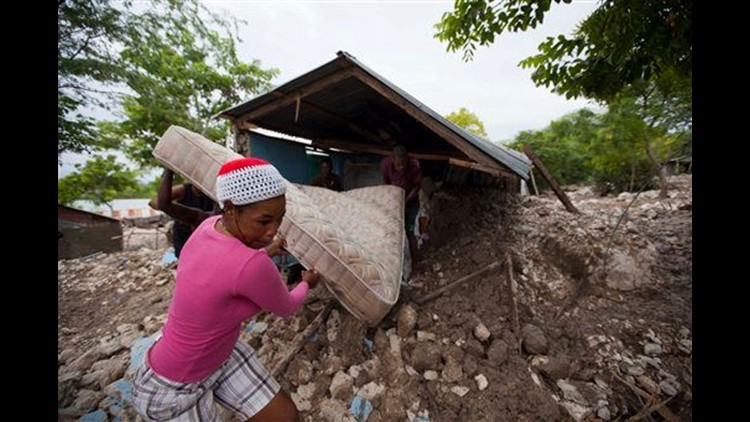ROSEAU, Dominica (AP) — Rescue crews jumped off boats and trudged Saturday through mud, rocks and uprooted trees to reach communities cut off by a tropical storm that killed at least 20 people and left nearly 50 missing in the eastern Caribbean island of Dominica.
Volunteers helped carry food, water and clothes for dozens of Dominicans who have been isolated for up to three days after Tropical Storm Erika dumped some 15 inches (38 centimeters) of rain this week on the mountainous island.
Prime Minister Roosevelt Skerrit pleaded for international aid, saying the damage pushed Dominica back by two decades. He met Saturday with members of a newly created committee charged with helping rebuild an island that officials said was devastated by floods and landslides.
"It's a very daunting task," said opposition leader Lennox Linton, who met with Skerrit. "The country has been significantly set back."
Heavy floods destroyed hundreds of homes and roads across Dominica, unleashing deadly landslides and turning streets into churning rivers. At least 20 people were still missing in the southeast village of Petite Savanne, considered one of the hardest hit areas and home to some of Dominica's steepest mountains.
"They are not expected to be found," Linton said of those missing, warning that the number of dead and missing would likely rise. Dozens of injured were still being airlifted to the hospital in the capital of Roseau.
As Dominicans struggled with the loss of family and property, they heeded Skerrit's advice to help each other.
Young men around Roseau fanned out to assist neighbors and clear roads, said Thomas Holmes, a guidance counselor who has been meeting with victims, adding that they are numbed by the disaster.
"We did not expect the storm to affect Dominica the way it did," he said. "We assumed we'd be getting some rain, but not for that duration. It hit Dominica for over 11 hours."
Officials said the flooding was so destructive in part because the small island has 365 rivers as well as several lakes and waterfalls. The main airport, which was recently renovated, remained closed and partially underwater, and dozens of bridges have been washed out.
Some Dominicans opted to take ferries to the nearby islands of Martinique and Guadeloupe to catch flights elsewhere to stay with friends and family. Those who stayed behind shoveled mud from their homes as television sets, bookcases and mattresses piled up outside.
"The destruction is unbelievable," said Terry Dyer, who lives on Dominica's west coast and is cut off from the capital. "It is sudden and widespread. I have never seen that before."
Go-fast boats zipped around Dominica, carrying rescuers and those seeking to reach relatives trapped in isolated communities.
"It's dicey and dangerous, but we're going what we can," said Assistant Police Superintendent Claude Weekes.
As Dominicans continued to dig out of the disaster on Saturday, Tropical Storm Erika dissipated after drenching Cuba, the Dominican Republic and Haiti.
At least one person died in Haiti in a suspected mudslide, and four others were killed and another 11 were hospitalized in Leogane, just west of the Haitian capital, when a truck carrying a liquor known locally as clairin crashed into a bus and exploded. Authorities said it apparently was raining when the accident occurred.
Haitian authorities also evacuated 254 prisoners in Gonaives to other locations because of flooding, and two people were hospitalized after their home in Port-au-Prince collapsed in heavy rains.
Before disintegrating, Erika also knocked out power to more than 200,000 people in Puerto Rico and caused more than $16 million in damage to crops there, including plantains, bananas and coffee.
Erika was a particularly wet storm, and moved across a region that has been struggling with the worst drought in recent years.
The remnants of Erika were expected to move near the coast of eastern and central Cuba on Saturday and into the southeastern Gulf of Mexico on Sunday. The Hurricane Center said that starting on Sunday, rainfall of 3 to 5 inches (7.6 to 12.7 centimeters), with locally heavier amounts, is possible across southern and central Florida. Gusty winds could occur over southern Florida beginning Sunday.
A state of emergency remained in place for all of Florida, and officials urged residents to fill gas tanks and stockpile food and water.
Meanwhile in the Pacific, Jimena turned into a powerful Category 4 hurricane with maximum sustained winds near 150 mph (240 kph). The Hurricane Center said it was expected to remain a major hurricane through Monday, though it did not pose an immediate threat to land.
___
Coto reported from San Juan, Puerto Rico. AP writers Anne-Marie Garcia in Havana, Evens Sanon in Port-au-Prince, Haiti and Tamara Lush in St. Petersburg, Florida contributed to this report.
Copyright 2015 The Associated Press. All rights reserved. This material may not be published, broadcast, rewritten or redistributed.



